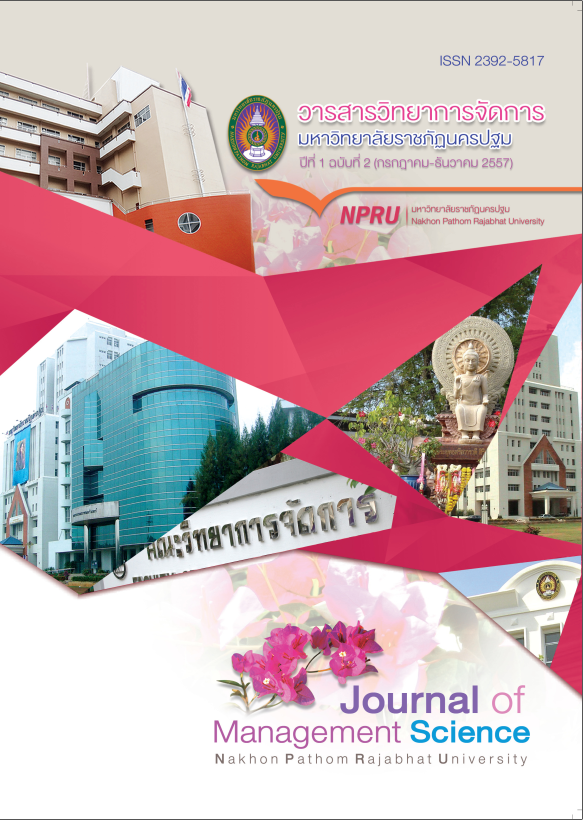Studying the Relationship between the Emotional Intelligence and Organizational Citizenship Behavior on Students in Faculty of Management Sciences, Nakhon Pathom Rajabhat University
Main Article Content
Abstract
The objectives of this research were 1) to study Emotional Intelligence level on students 2) to study the Organizational Citizenship Behavior level on students 3) to study the Relationship between The Emotional Intelligence and Organizational Citizenship Behavior on Students in Faculty of Managemen Sciences, Nakhon Pathom Rajabhat University. The sample were 353 students including freshmen, sophomores and juniors of Nakhon Pathom Rajabhat University in the second semester of the academic year 2013. The Questionnaire was used as the tool for data collection. The data was analyzed in term of frequency, percentage, means, standard deviation and correlation coefficient.
The results from this research indicated that:
1. Emotional Intelligence on students was at the high level (M=3.50,S.D=0.33).
2. Organizational Citizenship Behavior on students was at the high level (M=3.55, S.D=0.39).
3. Emotional Intelligence factors statistically related to Organizational Citizenship Behavior on Students in Faculty of Management Sciences, Nakhon Pathom Rajabhat University at the moderate level (rxy=.558) with the statistical significance at .01 level. Emotional Intelligence factors arranged from the highest to lowest levels were as follows: Self motivation , Empathy, Self-awareness and Social skills.
Article history : Accepted 14 August 2014
SIMILARITY INDEX = 2.52
Article Details
The views and opinions of the article appearing in this journal are those of the author. It is not considered a view and responsibility of the editorial staff.
References
กรมสุขภาพจิต. (2550). อีคิว: ความฉลาดทางอารมณ์ (ฉบับปรับปรุง). (พิมพ์ครั้งที่ 4). นนทบุรี : สํานักพัฒนาสุขภาพจิต.
มหาวิทยาลัยราชภัฏนครปฐม. (2556). วิสัยทัศน์มหาวิทยาลัยราชภัฏนครปฐม. ค้นเมื่อ 25 ตุลาคม 2556. จาก https://www.npru.ac.th/info/index2.php.
วัฒนา อ่อนแก้ว.(2554). พฤติกรรมการเป็นสมาชิกที่ดีขององค์การ : กรณีศึกษาข้าราชการสำนักงานคณะกรรมการข้าราชการครูและบุคลากรทางการศึกษา. การค้นคว้าอิสระปริญญารัฐประศาสนศาสตรมหาบัณฑิต. สาขาวิชารัฐประศาสนศาสตร์ มหาวิทยาลัยศิลปากร.
Goleman, Daniel. (1998). What with emotional intelligence. New York : Bantam Books.
Mayer, J. D. & Salovey, P. (1997). What is emotional intelligence? In P. Salovey & D. Sluyter (Eds). Emotional development and emotional intelligence: Implications for educators (pp. 3-31). New York: Basic Books.
Organ, Dennis W. and Thomas S. Bateman. (1991). Organizational Behavior. (4th ed.). Boston : Irwin, Inc.
Yamane,T. (1973). Statistic: An introductory analysis (3nd ed.). New York : Harper & Row.


